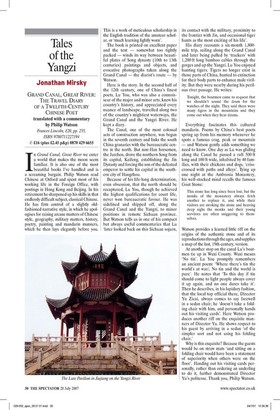Tales of the Yangzi
Jonathan Mirsky GRAND CANAL, GREAT RIVER: THE TRAVEL DIARY OF A TWELFTH-CENTURY CHINESE POET translated with a commentary by Philip Watson Frances Lincoln, £20, pp. 255, ISBN 9780711227194 £16 (plus £2.45 p&p) 0870 429 6655 /n Grand Canal, Great River we enter a world that makes the moon seem familiar. It is also one of the most beautiful books I've handled and is a screaming bargain. Philip Watson read Chinese at Oxford and spent most of his working life in the Foreign Office, with postings in Hong Kong and Beijing. In his retirement he sharpened up his skills in that endlessly difficult subject, classical Chinese. He has firm control of a slightly oldfashioned narrative style, in which he apologises for raising arcane matters of Chinese style, geography, military matters, history, poetry, painting and mandarin manners, which he then lays elegantly before you.
This is a work of meticulous scholarship in the English tradition of the amateur scholar, or 'much learning lightly worn'.
The book is printed on excellent paper and the text — somewhat too tightly packed — winds its way between beautiful plates of Song dynasty (10th to 13th centuries) paintings and objects, and evocative photographs taken along the Grand Canal — the diarist's route — by Watson.
Here is the story. In the second half of the 12th century, one of China's finest poets, Lu You, who was also a connoisseur of the major and minor arts, knew his country's history, and appreciated every nuance of landscape, travelled along two of the country's mightiest waterways, the Grand Canal and the Yangzi River. He kept a diary.
The Canal, one of the most colossal acts of construction anywhere, was begun in the seventh century and links the south China granaries with the bureaucratic centre in the north. But non-Han horsemen, the Jurchen, drove the northern Song from its capital, Kaifeng, establishing the Jin Dynasty and forcing the son of the defeated emperor to settle his capital in the southern city of Hangzhou.
Because of his life-long determination, even obsession, that the north should be recaptured, Lu You, though he achieved the highest qualifications for court life, never won bureaucratic favour. He was sidelined and shipped off, along the Grand Canal and the Yangzi, to minor positions in remote Sichuan province. But Watson tells us in one of his compact but always useful commentaries that Lu 'later looked back on this Sichuan sojurn, its contact with the military, proximity to the frontier with Jin, and occasional tiger hunts as the most exciting of his life'.
His diary recounts a six-month 1,800mile trip, sailing along the Grand Canal and later being pulled by 'trackers' with 1,200 ft long bamboo cables through the gorges and up the Yangzi. Lu You enjoyed hunting tigers. Tigers no longer exist in those parts of China, hunted to extinction for their body parts to enhance male virility. But they were nearby during his perilous river passage. He writes: Tonight, the boatmen came to request that we shouldn't sound the drum for the watches of the night. They said there were many tigers in the mountains and they come out when they hear drums.
Everything fascinates this cultured mandarin. Poems by China's best poets spring up from his memory whenever he spots a famous crag, peak or mountain — and Watson gently adds something we need to know. One day as Lu was gliding along the Canal he passed a raft 500 ft long and 100 ft wide, inhabited by 40 families, with their chickens and dogs, 'crisscrossed with paths and alleys'. Tying up one night at the Ambrosia Monastery, his well-stocked mind recalls the famous Goat Stone: This stone has long since been lost, but the monks of the monastery always fetch another to replace it, and while their visitors are stroking the stone and heaving deep sighs the monks and their young servitors are often sniggering to themselves.
Watson provides a learned little riff on the origins of the authentic stone and of its reproductions through the ages, and supplies a snap of the last, 19th-century, version.
At another stop on the canal Lu's boatmen tie up in Wuxi County. Wuxi means 'No tin'. Lu You promptly remembers an ancient poem: 'Where there's tin the world's at war!, No tin and the world is pure'. He notes that 'To this day if tin should come to light people always cover it up again, and no one dares take it'. Then he describes, in his lapidary fashion, that the local top official there, Director Yu Zicai, always comes to say farewell in a sedan chair; he 'doesn't take a folding chair with him, and personally hands out his visiting cards'. Here Watson produces another riff on the exquisite manners of Director Yu. He shows respect to his guest by arriving in a sedan 'of the simpler sort and not using his folding chair.'
Why is this exquisite? Because the guests would be on straw mats 'and sitting on a folding chair would have been a statement of superiority when others were on the floor'. Handing out his visiting cards personally, rather than ordering an underling to do it, further demonstrated Director Yu's politesse. Thank you, Philip Watson.








































 Previous page
Previous page